新概念英语青少版 1B
- 格式:doc
- 大小:46.00 KB
- 文档页数:13
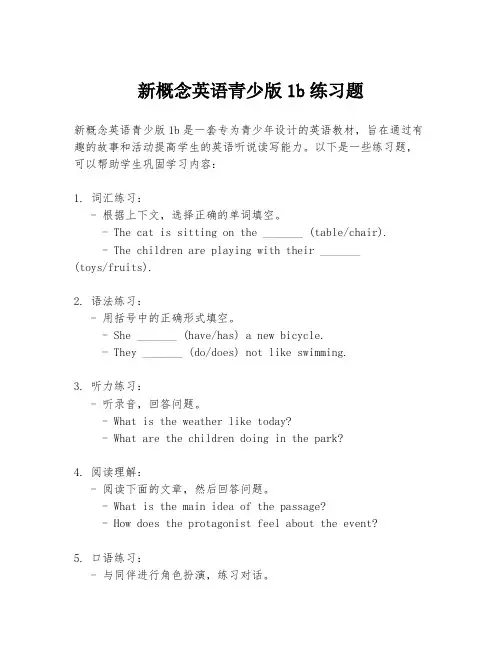
新概念英语青少版1b练习题新概念英语青少版1b是一套专为青少年设计的英语教材,旨在通过有趣的故事和活动提高学生的英语听说读写能力。
以下是一些练习题,可以帮助学生巩固学习内容:1. 词汇练习:- 根据上下文,选择正确的单词填空。
- The cat is sitting on the _______ (table/chair).- The children are playing with their _______(toys/fruits).2. 语法练习:- 用括号中的正确形式填空。
- She _______ (have/has) a new bicycle.- They _______ (do/does) not like swimming.3. 听力练习:- 听录音,回答问题。
- What is the weather like today?- What are the children doing in the park?4. 阅读理解:- 阅读下面的文章,然后回答问题。
- What is the main idea of the passage?- How does the protagonist feel about the event?5. 口语练习:- 与同伴进行角色扮演,练习对话。
- Role-play a conversation at a birthday party.- Role-play asking for directions in a new city.6. 写作练习:- 根据提示写一篇短文。
- Write a short story about a day at the beach.- Describe your favorite holiday and why you enjoy it.7. 综合练习:- 阅读下面的对话,然后回答问题或完成句子。
- What does the boy want to do after school?- Where is the girl going to meet her friends?8. 文化知识:- 阅读有关英语国家文化的文章,并回答相关问题。
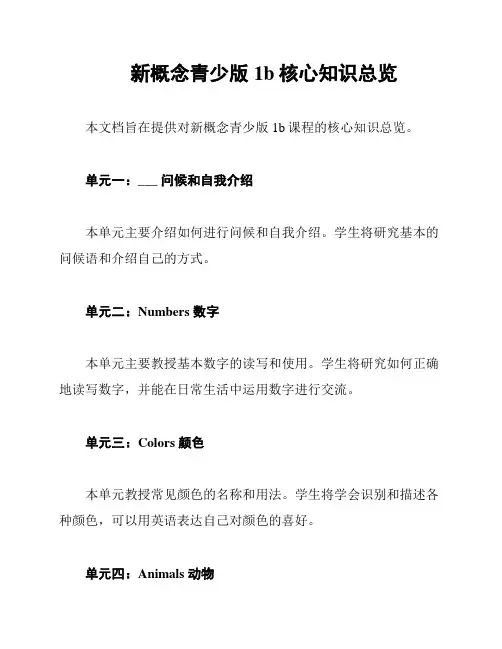
新概念青少版1b核心知识总览本文档旨在提供对新概念青少版1b课程的核心知识总览。
单元一:___ 问候和自我介绍本单元主要介绍如何进行问候和自我介绍。
学生将研究基本的问候语和介绍自己的方式。
单元二:Numbers 数字本单元主要教授基本数字的读写和使用。
学生将研究如何正确地读写数字,并能在日常生活中运用数字进行交流。
单元三:Colors 颜色本单元教授常见颜色的名称和用法。
学生将学会识别和描述各种颜色,可以用英语表达自己对颜色的喜好。
单元四:Animals 动物本单元主要介绍各种动物的名称和特征。
学生将学会识别不同的动物,并能就动物的特征进行简单描述。
单元五:Family 家庭本单元教授家庭成员的称呼和介绍家庭的方式。
学生将学会用英语表达自己的家庭关系,并了解其他同学的家庭情况。
单元六:Food and Drinks 食物和饮料本单元介绍各种食物和饮料的名称和喜好。
学生将学会通过英语表达自己喜欢或不喜欢的食物和饮料。
单元七:___ 衣服和天气本单元教授各种服装和天气的名称以及对其的描述。
学生将学会通过英语描述自己穿着的服装和描述当天的天气情况。
单元八:Hobbies and Activities 爱好和活动本单元介绍各种爱好和活动的名称和描述。
学生将学会用英语表达自己的兴趣爱好,并能邀请他人一起参加活动。
单元九:Time and Daily Routines 时间和日常活动本单元主要教授时间的表达方式和日常活动的描述。
学生将学会询问时间和描述自己的日常活动安排。
单元十:n 交通工具本单元教授各种交通工具的名称和用途。
学生将学会通过英语表达自己常用的交通工具,并了解其他交通工具的特点。
以上为新概念青少版1b课程的核心知识总览。
每个单元都将涵盖基本的词汇、句型和交流技巧,旨在帮助学生提升英语听、说、读、写的能力。
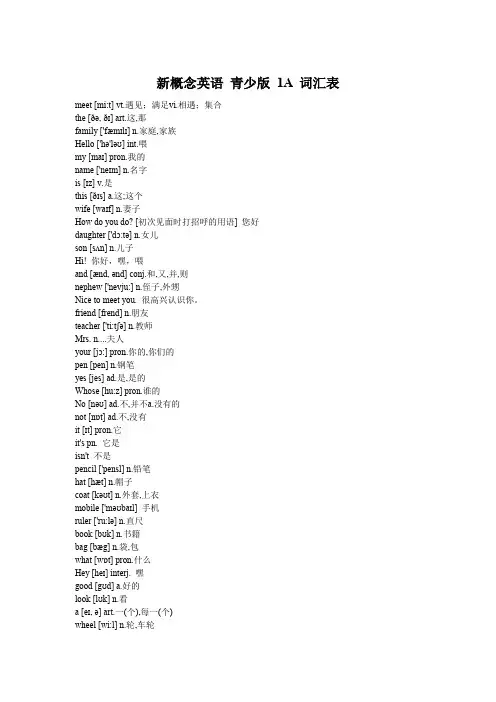
新概念英语青少版1A 词汇表meet [mi:t] vt.遇见;满足vi.相遇;集合the [ðə, ðɪ] art.这,那family ['fæmɪlɪ] n.家庭,家族Hello ['hə'ləʊ] int.喂my [maɪ] pron.我的name ['neɪm] n.名字is [ɪz] v.是this [ðɪs] a.这;这个wife [waɪf] n.妻子How do you do? [初次见面时打招呼的用语] 您好daughter ['dɔ:tə] n.女儿son [sʌn] n.儿子Hi! 你好,嘿,喂and [ænd, ənd] conj.和,又,并,则nephew ['nevju:] n.侄子,外甥Nice to meet you. 很高兴认识你。
friend [frend] n.朋友teacher ['ti:tʃə] n.教师Mrs. n....夫人your [jɔ:] pron.你的,你们的pen [pen] n.钢笔yes [jes] ad.是,是的Whose [hu:z] pron.谁的No [nəʊ] ad.不,并不a.没有的not [nɒt] ad.不,没有it [ɪt] pron.它it's pn. 它是isn't 不是pencil ['pensl] n.铅笔hat [hæt] n.帽子coat [kəʊt] n.外套,上衣mobile ['məʊbaɪl] 手机ruler ['ru:lə] n.直尺book [bʊk] n.书籍bag [bæg] n.袋,包what [wɒt] pron.什么Hey [heɪ] interj. 嘿good [gʊd] a.好的look [lʊk] n.看a [eɪ, ə] art.一(个),每一(个)wheel [wi:l] n.轮,车轮green [gri:n] a.绿色的n.绿色OK ['əʊ'keɪ] int.行,好now [naʊ] n.现在flower ['flaʊə] n.花red [red] a.红色的n.红色umbrella [ʌm'brelə] n.伞,雨伞that [ðæt] a.那,那个grey [greɪ] n./a.灰色(的)bird [bɜ:d] n.鸟,禽key [ki:] n.钥匙right [raɪt] a.正确的silver ['sɪlvə] n.银色的chair [tʃeə] n.椅子table ['teɪbl] n.桌子bicycle ['baɪsɪkl] n.自行车colour ['kʌlə] n.颜色what colour...? ......什么颜色?an [æn, ən] art.一(个,件...) white [waɪt] a.白的n.白色black [blæk] a.黑色的,黑暗的dress [dres] n.连衣裙camera ['kæmərə] n.照相机,摄影机blue [blu:] a.蓝色的n.蓝色desk [desk] n.书桌,办公桌brown [braʊn] n.褐色,棕色who [hu:] pron.谁boy [bɒɪ] n.男孩,少年,家伙which ['wɪtʃ] pron.哪一个a.哪一个on [ɒn] prep.在…上man [mæn] n.男人with [wɪð] prep.有,带着Mr. n.先生he [hi:] pron.(主格)他father ['fɑ:ðə] n.父亲woman ['wʊmən] n.妇女,女性she [ʃi:, ʃɪ] pron.她mother ['mʌðə] n.母亲girl [gɜ:l] n.女孩子sister [sɪstə] n.姐妹look at 看着;注视;察看young [jʌŋ] a.年轻的n.青年们in [ɪn] prep.在…里old [əʊld] a.陈旧的cousin ['kʌzn] n.堂(表)兄弟(姐妹)Oh 噢!car [kɑ:] n.轿车so [səʊ] conj.那么,这样看来too [tu:] ad.也,还;太their [ðeə] pron.他(她,它)们的brother ['brʌðə] n.兄弟student ['stju:dənt] n.学生his [hɪs] pron.他的,他的东西her [hɜ:, hə] pron.(宾格)她,她的new [nju:] a.新的horse [hɔ:s] n.马Tell me about 告诉我关于......yellow ['jeləʊ] a.黄色的n.黄色taxi ['tæksɪ] n.出租汽车well [wel] ad.健康的how [haʊ] ad.怎么,怎样,多少How are you? 你好吗?I [aɪ] pron.(主格)我am [æm, əm] v.是fine [faɪn] a.健康的,舒适的but [bʌt] conj.但是,可是very ['verɪ] ad.很,非常sorry ['sɒrɪ] a.难过的;对不起的him [hɪm] pron.(宾格)他What's the matter with? ......怎么了?hot [hɒt] a.热的,刺激的,辣的sure [ʃʊə] a.确信的,确实的hungry ['hʌŋgrɪ] a.饥饿的,渴望的thirsty ['θɜ:stɪ] a.渴的;渴望的poor [pʊə] a.贫穷的;可怜的What about? ......呢?doctor ['dɒktə] n.医生,博士busy ['bɪzɪ] a.繁忙的ill [ɪl] a.有病的perhaps [pə'hæps] ad.也许,可能are [ɑ:] v.是Better safe than sorry 有备无患!cold [kəʊld] a.冷的or [ɔ:, ə] conj.或,或者clever ['klevə] a.聪明的,机敏的happy ['hæpɪ] a.快乐的,幸福的stupid ['stju:pɪd] a.愚蠢的story ['stɔ:rɪ] n.故事,小说funny ['fʌnɪ] a.好笑的,有趣的,滑稽的sad [sæd] a.悲哀的silly ['sɪlɪ] a.傻的,愚蠢的neighbour ['neɪbə] n.邻居nice ['naɪs] a.美好的,令人愉快的What do you do? 你是做什么工作的?at [æt, ət] prep.在sports academy 体育学院come [kʌm] vi.来,来到,出现art college 艺术学院writer ['raɪtə] n.作者,作家aunt [ɑ:nt] n.伯母,婶母,姑母our ['aʊə] pron.我们的husband ['hʌzbənd] n.丈夫Thank you! 谢谢你!everybody ['evrɪbɒdɪ] pron.每人,人人for [fɔ:, fə] prep.为,给,因为welcome ['welkəm] int.欢迎n.欢迎vt.欢迎her [hɜ:, hə] pron.(宾格)她,她的housewife ['haʊswaɪf] n.家庭主妇job [dʒɒb] n.职业,工作photographer [fə'tɒgrəfə] n. 摄影师policeman [pə'li:smən] n.警察postman ['pəʊstmən] n.邮递员actor ['æktə] n.男演员accountant [ə'kaʊntənt] n.会计,会计师tall [tɔ:l] n.高的,身材高的gossip ['gɒsɪp] n.闲谈,碎嘴子,漫笔pretty ['prɪtɪ] ad.相当地a.漂亮的over there 在那里(指较远处)where [weə] ad.在哪里pron.哪里from [frɒm, frəm, frm] prep.从…来,根据English ['ɪŋglɪʃ] n.英语a.英国人的American [ə'merɪkən] a.美洲的n.美国人Washington ['wɒʃɪŋtən] n.华盛顿here [hɪə] ad.这里,向这里famous ['feɪməs] a.著名的expensive [ɪks'pensɪv] a.昂贵的,花钱多的beautiful ['bju:tɪfʊl] a.美的,美丽的handsome ['hændsəm] a.英俊的wait [weɪt] vi.等待n.等待see [si:] vt.看见London ['lʌndən] n.伦敦nationality ['næʃə'nælɪtɪ] n.国籍,民族describe [dɪs'kraɪb] vt.形容,描写,描绘short [ʃɔ:t] a.短的;矮的Chinese ['tʃaɪ'ni:z] a.中国的n.中国人French [frentʃ] a.法国的n.法国人fat [fæt] a.肥胖的n.脂肪,肥肉thin [θɪn] a.薄的;淡的;瘦的actress ['æktrɪs] n.女演员Mum [mʌm] n.(口语)妈妈one [wʌn] a.一样的东西favourite ['feɪvərɪt] n.特别喜爱的人(或物) a.最爱的long [lɒŋ] a.长的,远的schoolbag n. 书包give [gɪv] vt.送给me [mi:, mɪ] pron.我please [pli:z] ad.请Here you are. 给你。
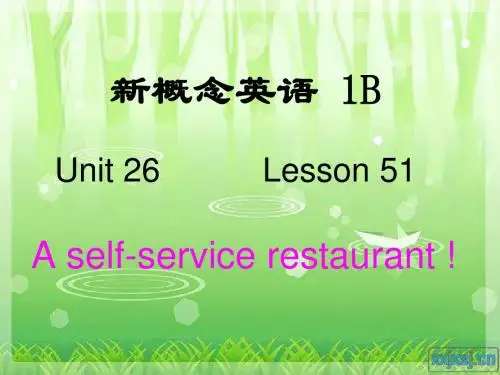
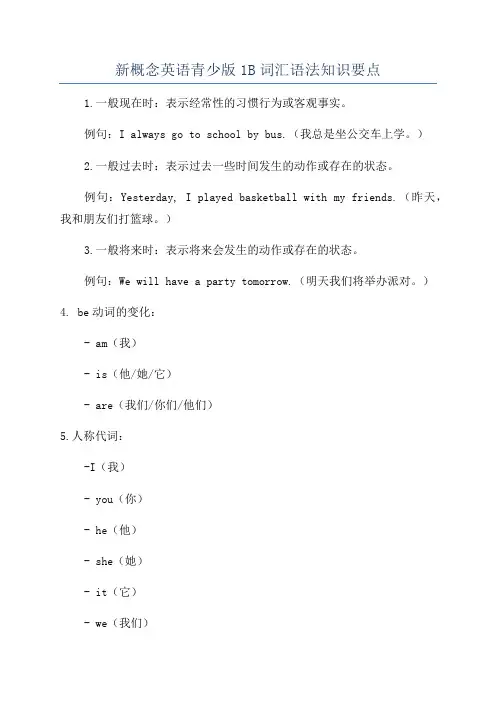
新概念英语青少版1B词汇语法知识要点1.一般现在时:表示经常性的习惯行为或客观事实。
例句:I always go to school by bus.(我总是坐公交车上学。
)2.一般过去时:表示过去一些时间发生的动作或存在的状态。
例句:Yesterday, I played basketball with my friends.(昨天,我和朋友们打篮球。
)3.一般将来时:表示将来会发生的动作或存在的状态。
例句:We will have a party tomorrow.(明天我们将举办派对。
)4. be动词的变化:- am(我)- is(他/她/它)- are(我们/你们/他们)5.人称代词:-I(我)- you(你)- he(他)- she(她)- it(它)- we(我们)- they(他们)6.形容词的比较级和最高级形式:用于比较两个或多个事物的大小或程度。
- 比较级:在形容词前面加上-er,如taller(更高的), faster (更快的)- 最高级:在形容词前面加上-est,如tallest(最高的),fastest(最快的)7.介词:用于表示关系、位置、方向等。
- in(在...内部)- on(在...上面)- under(在...下面)- behind(在...后面)- beside(在...旁边)8.物主代词:用于表示所属关系。
- my(我的)- your(你的)- his(他的)- her(她的)- its(它的)- your(你们的)- their(他们的)9.句子结构:主语+谓语+宾语(SVO)。
例句:My sister likes ice cream.(我的姐姐喜欢冰淇淋。
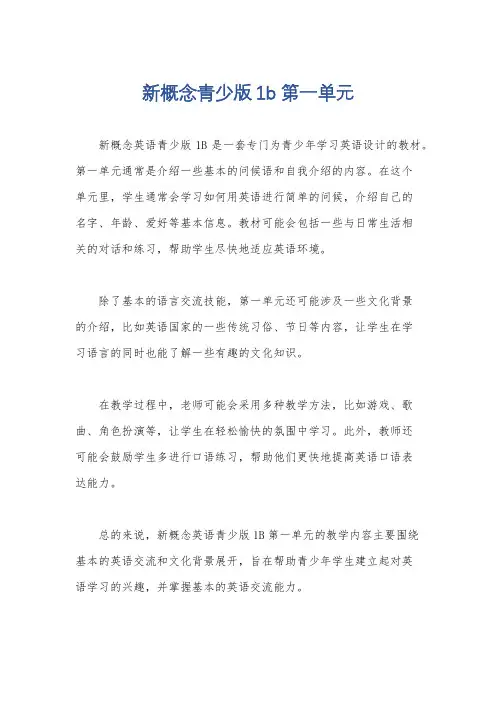
新概念青少版1b第一单元
新概念英语青少版1B是一套专门为青少年学习英语设计的教材。
第一单元通常是介绍一些基本的问候语和自我介绍的内容。
在这个
单元里,学生通常会学习如何用英语进行简单的问候,介绍自己的
名字、年龄、爱好等基本信息。
教材可能会包括一些与日常生活相
关的对话和练习,帮助学生尽快地适应英语环境。
除了基本的语言交流技能,第一单元还可能涉及一些文化背景
的介绍,比如英语国家的一些传统习俗、节日等内容,让学生在学
习语言的同时也能了解一些有趣的文化知识。
在教学过程中,老师可能会采用多种教学方法,比如游戏、歌曲、角色扮演等,让学生在轻松愉快的氛围中学习。
此外,教师还
可能会鼓励学生多进行口语练习,帮助他们更快地提高英语口语表
达能力。
总的来说,新概念英语青少版1B第一单元的教学内容主要围绕
基本的英语交流和文化背景展开,旨在帮助青少年学生建立起对英
语学习的兴趣,并掌握基本的英语交流能力。
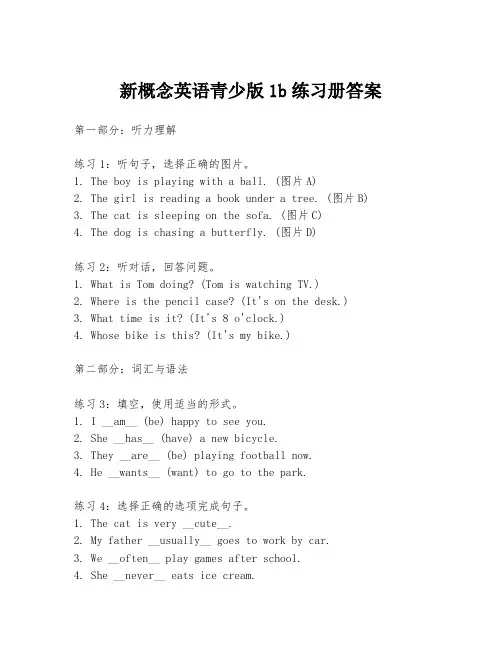
新概念英语青少版1b练习册答案第一部分:听力理解练习1:听句子,选择正确的图片。
1. The boy is playing with a ball. (图片A)2. The girl is reading a book under a tree. (图片B)3. The cat is sleeping on the sofa. (图片C)4. The dog is chasing a butterfly. (图片D)练习2:听对话,回答问题。
1. What is Tom doing? (Tom is watching TV.)2. Where is the pencil case? (It's on the desk.)3. What time is it? (It's 8 o'clock.)4. Whose bike is this? (It's my bike.)第二部分:词汇与语法练习3:填空,使用适当的形式。
1. I __am__ (be) happy to see you.2. She __has__ (have) a new bicycle.3. They __are__ (be) playing football now.4. He __wants__ (want) to go to the park.练习4:选择正确的选项完成句子。
1. The cat is very __cute__.2. My father __usually__ goes to work by car.3. We __often__ play games after school.4. She __never__ eats ice cream.第三部分:阅读理解练习5:阅读短文,判断正误。
Tom is a student. He is ten years old. He likes playingfootball and reading books. He has a little sister named Lily. They often play together.1. Tom is twelve years old. (False)2. Tom likes playing basketball. (False)3. Tom has a sister named Lily. (True)4. Tom and Lily don't play together. (False)第四部分:写作练习6:写一篇短文,描述你的一天。
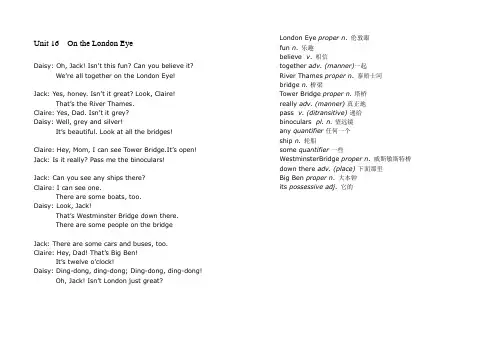
Unit 16 On the London EyeDaisy: Oh, Jack! Isn’t this fun? Can you believe it?We’re all together on the London Eye!Jack: Yes, honey. Isn’t it great? Look, Claire!That’s the River Thames.Claire: Yes, Dad. Isn’t it grey?Daisy: Well, grey and silver!It’s beautiful. Look at all the bridges! Claire: Hey, Mom, I can see T ower Bridge.It’s open! Jack: Is it really? Pass me the binoculars!Jack: Can you see any ships there?Claire: I can see one.There are some boats, too.Daisy: Look, Jack!That’s Westminster Bridge down there.There are some people on the bridgeJack: There are some cars and buses, too.Claire: Hey, Dad! That’s Big Ben!It’s twelve o’clock!Daisy: Ding-dong, ding-dong; Ding-dong, ding-dong!Oh, Jack! Isn’t London just great?London Eye proper n. 伦敦眼fun n. 乐趣believe v. 相信together adv. (manner)一起River Thames proper n. 泰晤士河bridge n.桥梁Tower Bridge proper n.塔桥really adv. (manner)真正地pass v. (ditransitive)递给binoculars pl. n.望远镜any quantifier任何一个ship n. 轮船some quantifier一些WestminsterBridge proper n. 威斯敏斯特桥down there adv. (place)下面那里Big Ben proper n. 大本钟its possessive adj. 它的Unit 17 Smile, please!Flora:Watch this, Lucy!I can balance on this ball! Can you do it? Lucy: I can try.Lucy: Oh, yes!I can balance on a ball as well. It’s easy! Look at us, Vikki!Flora: Look at me now, Lucy!I’m on my knees! Can you balance like this? Lucy:Yes, I can do that, too. It’s fun!Flora: Come on, Vikki!Can you balance on a big ball like us? Vikki: No, I can’t.You’re both good at gymnastics,but I’m useless. I can’t do it.Lucy: Never mind, Vikki!You can do Maths and Music an d I can’t!I’m useless at Maths.Flora: And you can take a photo of us! Come on! Take a photo on your mobile.Vikki: OK.Ready? One, two, three!Smile, please! smile v. 微笑watch v. 看balance v. 保持平衡do v.做try v. 尝试as well adv. ( focus)也easy adj.简单的,容易的on one’s knees adv. phrase跪着good at adj. + prep. 擅长gymnastics n. 体操useless adj.差劲的,无能的Maths proper n. (BrE., Math AmE.)数学Music proper n.音乐take v. 照(相)take a photo fixed phrase照相gym n.体育馆Unit 18 Men can cook, too!William: Let’s cook dinner, Robert. You can help me. Give me some rice, please. There’s some rice in t hat jar. Put some water inthe pan, and pass me a knife, please.Robert: Which one?William: That one on the table.。
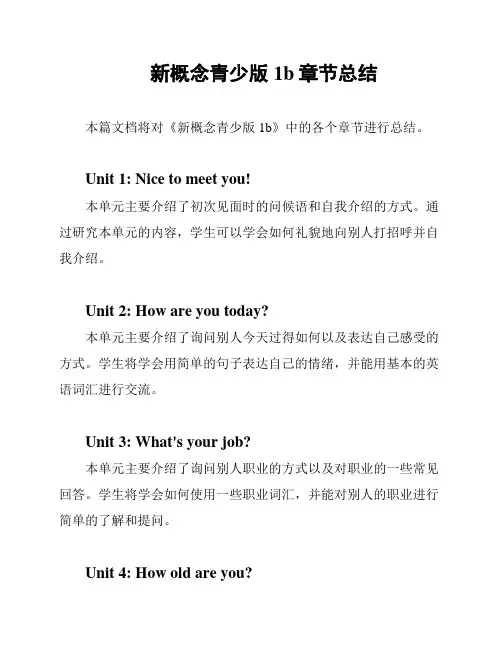
新概念青少版1b章节总结
本篇文档将对《新概念青少版1b》中的各个章节进行总结。
Unit 1: Nice to meet you!
本单元主要介绍了初次见面时的问候语和自我介绍的方式。
通过研究本单元的内容,学生可以学会如何礼貌地向别人打招呼并自我介绍。
Unit 2: How are you today?
本单元主要介绍了询问别人今天过得如何以及表达自己感受的方式。
学生将学会用简单的句子表达自己的情绪,并能用基本的英语词汇进行交流。
Unit 3: What's your job?
本单元主要介绍了询问别人职业的方式以及对职业的一些常见回答。
学生将学会如何使用一些职业词汇,并能对别人的职业进行简单的了解和提问。
Unit 4: How old are you?
本单元主要介绍了询问别人年龄的方式以及回答年龄的方法。
学生将学会用简单的句子表达自己的年龄,并能用基本的英语数字进行交流。
Unit 5: What's this in English?
本单元主要介绍了一些常见物品的英语名称。
学生将学会认识一些基本的日常用品,并能用英语进行简单的物品交流。
以上是《新概念青少版1b》各个章节的简要总结。
通过研究这些内容,学生将能够掌握基本的英语问候语和自我介绍,能够进行简单的情感表达和职业交流,还能够认识一些基本的日常用品并用英语进行简单的物品交流。
希望这些内容能帮助学生在初学英语的过程中打下坚实的基础。
注意:以上总结均为个人观点,具体内容请以教材为准。
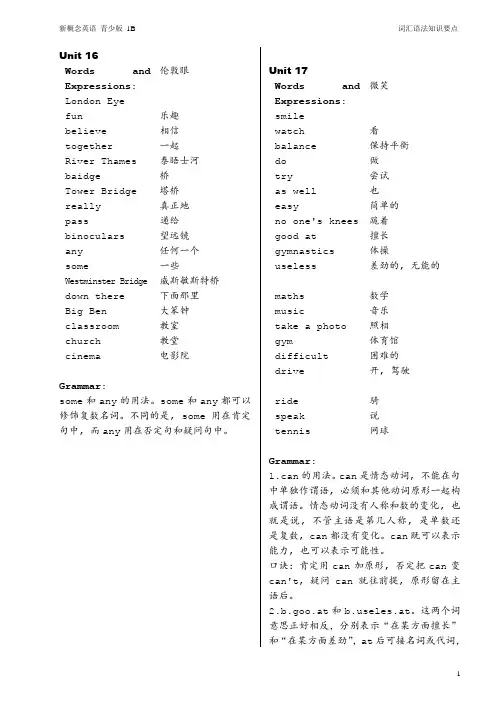
Unit 16Words andExpressions:London Eye伦敦眼fun 乐趣believe 相信together 一起River Thames 泰晤士河baidge 桥Tower Bridge 塔桥really 真正地pass 递给binoculars 望远镜any 任何一个some 一些Westminster Bridge 威斯敏斯特桥down there 下面那里Big Ben 大笨钟classroom 教室church 教堂cinema 电影院Grammar:some和any的用法。
some和any都可以修饰复数名词。
不同的是, some用在肯定句中, 而any用在否定句和疑问句中。
Unit 17Words andExpressions:smile微笑watch 看balance 保持平衡do 做try 尝试as well 也easy 简单的no one's knees 跪着good at 擅长gymnastics 体操useless 差劲的, 无能的maths 数学music 音乐take a photo 照相gym 体育馆difficult 困难的drive 开, 驾驶ride 骑speak 说tennis 网球Grammar:1.can的用法。
can是情态动词, 不能在句中单独作谓语, 必须和其他动词原形一起构成谓语。
情态动词没有人称和数的变化, 也就是说, 不管主语是第几人称, 是单数还是复数, can都没有变化。
can既可以表示能力, 也可以表示可能性。
口诀:肯定用can加原形, 否定把can变can't, 疑问can就往前提, 原形留在主语后。
2.b.goo.at和eles.at。
这两个词意思正好相反,分别表示“在某方面擅长”和“在某方面差劲”,at后可接名词或代词,表示擅长或差劲的方面。
Unit 18Words andExpressions:cook做饭菜, 烹调dinner 晚餐rice 大米pan 平底锅chop 切开onion 洋葱spoon 勺子fork 叉子drawer 抽屉wet 湿的You see,…你看, ……restaurant 餐馆, 饭店must 必须jug 罐子dry 干燥的sugar 糖食milk 牛奶scanner 扫描仪computer 电脑packet 小包coffee 咖啡tea 茶叶bottle 瓶子orange juice 橙汁fridge 冰箱sea 海Grammar:可数名词和不可数名词。
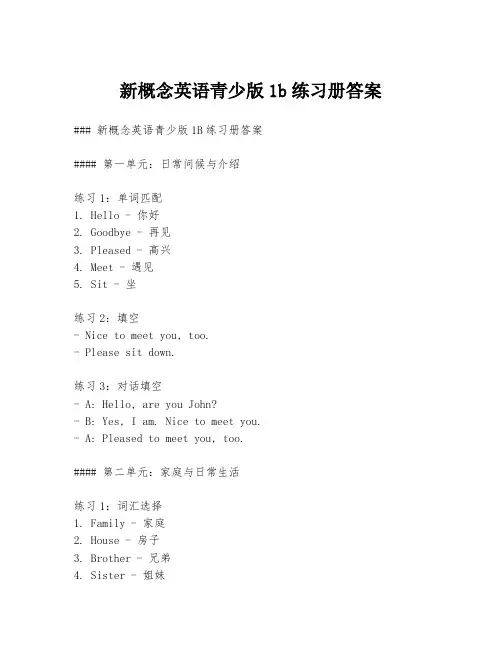
新概念英语青少版1b练习册答案### 新概念英语青少版1B练习册答案#### 第一单元:日常问候与介绍练习1:单词匹配1. Hello - 你好2. Goodbye - 再见3. Pleased - 高兴4. Meet - 遇见5. Sit - 坐练习2:填空- Nice to meet you, too.- Please sit down.练习3:对话填空- A: Hello, are you John?- B: Yes, I am. Nice to meet you.- A: Pleased to meet you, too.#### 第二单元:家庭与日常生活练习1:词汇选择1. Family - 家庭2. House - 房子3. Brother - 兄弟4. Sister - 姐妹5. Mother - 母亲练习2:句子构建- This is my family.- My brother is reading a book.练习3:对话练习- A: Who is that girl?- B: That's my sister.#### 第三单元:学校生活练习1:词汇连线1. School - 学校2. Teacher - 老师3. Student - 学生4. Classroom - 教室5. Homework - 作业练习2:选择题- Q: What does the student do after school? - A: He does his homework.练习3:对话完成- A: Where do you go every day?- B: I go to school.#### 第四单元:食物与饮食练习1:词汇匹配1. Apple - 苹果2. Banana - 香蕉3. Milk - 牛奶4. Bread - 面包5. Cheese - 奶酪练习2:填空- I like bananas and apples.练习3:对话填空- A: Would you like some milk? - B: Yes, please.#### 第五单元:颜色与衣物练习1:颜色匹配1. Red - 红色2. Blue - 蓝色3. Green - 绿色4. Yellow - 黄色5. Black - 黑色练习2:选择正确的颜色- The sky is blue.练习3:对话练习- A: What color is your shirt? - B: It's red.#### 第六单元:动物与宠物练习1:动物词汇1. Dog - 狗2. Cat - 猫3. Bird - 鸟4. Fish - 鱼5. Rabbit - 兔子练习2:填空- The cat is on the sofa.练习3:对话填空- A: Do you have a pet?- B: Yes, I have a dog.#### 第七单元:天气与季节练习1:天气词汇1. Sunny - 晴朗的2. Rainy - 下雨的3. Snowy - 下雪的4. Windy - 有风的5. Cloudy - 多云的练习2:选择正确的天气描述- Today is a sunny day.练习3:对话练习- A: What's the weather like? - B: It's rainy.#### 第八单元:旅行与地点练习1:地点词汇1. Park - 公园2. Zoo - 动物园3. Museum - 博物馆4. Beach - 海滩5. Mountain - 山练习2:填空- Let's go to the zoo.练习3:对话填空- A: Where do you want to go on vacation?- B: I want to go to the beach.请注意,以上内容仅为示例,实际的练习册答案可能会有所不同。
新概念英语青少版 1B 词汇表Lesson31London Eye伦敦眼fun [fʌn] adj. 有趣的believe [bɪˈli:v] vt. 相信together [təˈgeðə(r)] adv. 一起River Thames [temz] n.泰晤士河bridge [brɪdʒ] n. 桥梁Tower Bridge n. 塔桥really [ˈri:əli] adv. 真正地binoculars [bɪˈnɒkjələz] n. 双筒望远镜pass [pɑ:s] vt. 递给any [ˈeni]任何一个Westminster Bridge [ˈwestmɪnstə(r)]威斯敏斯特大桥some [səm] adj. 一些down there [daʊn][ðer]在那儿Big Ben(伦敦英国议会大厦钟楼上的)大本钟its [ɪts] pron. 它的Lesson32church [tʃɜ:tʃ] n. 教堂cinema [ˈsɪnəmə] n. 电影院smile [smaɪl] v. 微笑balance [ˈbæləns] v. 保持平衡try [traɪ] v. 尝试as well也easy [ˈi:zi] adj. 简单的,容易的on one's knees 跪着good at 善于gymnastics [dʒɪmˈnæstɪks] n. 体操useless [ˈju:sləs] adj. 差劲的,无能的take a photo拍照gym [dʒɪm] n. 体育馆Lesson34difficult [ˈdɪfɪkəlt] adj. 困难的drive [draɪv] v. 开,驾驶ride [raɪd] v. 骑speak [spi:k] v. 说tennis [ˈtenɪs] n. 网球Lesson35cook [kʊk] v. 做饭菜,烹调dinner [ˈdɪnə(r)] n. 晚餐water [ˈwɔ:tə(r)] n. 水chop [tʃɒp] vt. 剁碎onion [ˈʌnjən] n. 洋葱spoon [spu:n] n. 匙,勺子get [get] vt. 拿来,获得fork [fɔ:k] n. 餐叉drawer [drɔ:(r)] n. 抽屉wet [wet] adj. 湿的You see,…你瞧…open [ˈəʊpən] v. 开办restaurant [ˈrestrɒnt] n. 餐馆,饭店oh, yeah! 噢,是的!must [mʌst] v. 必须jug [dʒʌg] n. 水壶dry [draɪ] adj. 干的sugar [ˈʃʊgə(r)] n. 糖Lesson36scanner [ˈskænə(r)] n. 扫描仪computer [kəmˈpju:tə(r)] n. 电脑packet [ˈpækɪt] n. 小包coffee [ˈkɒfi] n. 咖啡tea [ti:] n. 茶叶bottle [ˈbɒtl] n. 瓶子orange juice橘子汁fridge [frɪdʒ] n. 电冰箱sea [si:] n. 海Lesson37finish [ˈfɪnɪʃ] vt. 完成why not为什么不?tired [ˈtaɪəd] adj. 疲倦的problem [ˈprɒbləm] n. 难题lots of 许多;大量salad [ˈsæləd] n. 沙拉dish [dɪʃ] n. 菜肴drink [drɪŋk] v. 喝mustn't [ˈmʌsnt] v. 不能peach [pi:tʃ] n. 桃子Help yourself. [jɔ:ˈself]请自便吧!Lesson38grape [greɪp] n. 葡萄buy [baɪ] vt. 购买bread [bred] n. 面包tin [tɪn] n. 金属盒cheese [tʃi:z] n. 奶酪butter [ˈbʌtə(r)] n. 黄油Lesson39surprise [səˈpraɪz] n. 惊奇,意外lesson [ˈlesn] n. 课half past…[hɑ:f]…点半a quarter to/past …[ˈkwɔ:tə(r)]…差/过一刻talk [tɔ:k] v. 谈话find [faɪnd] vt. 发现when [wen] adv. 什么时候look for寻找Lesson40wash [wɒʃ] n. 洗涤then [ðen] adv. 然后Lesson41breakfast blue [ˈbrekfəst]早餐忧郁do [du] v. 助动词want [wɒnt] vt. 想要not really [ˈri:əli]不完全是,不太something [ˈsʌmθɪŋ] pron. 某事,某物train [treɪn] v. 训练stomach [ˈstʌmək] n. 胃have got 有pot [pɒt] n. 壶start [stɑ:t] v. 开始morning [ˈmɔ:nɪŋ] n. 早晨yoghurt ['jəʊgɜ:t] n. 酸奶canteen [kænˈti:n] n. 餐厅terrible [ˈterəbl] adj. 极坏的,可怕的Lesson42chocolate [ˈtʃɒklət] n. 巧克力beer [bɪə(r)] n. 啤酒paper [ˈpeɪpə(r)] n. 纸string [strɪŋ] n. 细绳money [ˈmʌni] n. 金钱spare [speə(r)] adj. 空闲的Lesson43a lot of 很多shy [ʃaɪ] adj. 害羞的introduce sb./sth. to…[ˌɪntrəˈdju:s]向…介绍某人/某物studies ['stʌdɪz] n. 学习,研究(study的复数)true [tru:] adj. 真实的always [ˈɔ:lweɪz] adv. 总是Lesson44jacket [ˈdʒækɪt] n. 夹克衫magazine [ˌmægəˈzi:n] n. 杂志video [ˈvɪdiəʊ] n. 录像带blouse [blaʊz] n. 女士衬衫vegetable [ˈvedʒtəbl] n. 蔬菜relative [ˈrelətɪv] n. 亲戚Lesson45kind [kaɪnd] n. 种,类Let me think 让我想想Japanese [ˌdʒæpə'ni:z] adj.日本的remember [rɪˈmembə(r)] vt. 记得I know!我知道了!lucky [ˈlʌki] adj. 幸运的another [əˈnʌðə(r)] pron. 另一个at any time 随时,任何时候Lesson46British [ˈbrɪtɪʃ] adj. 英国的German [ˈdʒɜ:mən] adj. 德国的plastic [ˈplæstɪk] n. 塑料leather ˈleðə(r)] n. 皮革CD player CD播放机Italian [ɪ'tælɪən] adj. 意大利的watch [wɒtʃ] n. 手表Korean [kə'rɪən] adj. 韩国的handbag [ˈhændbæg] n. 手提包clock [klɒk] n. 钟Swiss [swɪs] n. 瑞士的very much 非常Lesson47salmon [ˈsæmən] n. 鲑鱼piece [pi:s] n. 一片,一块tonight [təˈnaɪt] n.今晚lettuce [ˈletɪs] n. 生菜cucumber [ˈkju:kʌmbə(r)] n. 黄瓜fantastic [fænˈtæstɪk] adj. 极好的pick [pɪk] vi. 摘strawberry [ˈstrɔ:bəri] n. 草莓dessert [dɪˈzɜ:t] n. 甜点healthy [ˈhelθi] adj. 健康的meal [mi:l] n. 膳食,一餐worry [ˈwʌri] n. 担心cream [kri:m] n. 奶油first [fɜ:st] adv. 首先Lesson48hate [heɪt] vt. 憎恨,讨厌sweet [swi:t] n. 糖果,甜食wine [waɪn] n. 葡萄酒Lesson49weekend [ˌwi:kˈend] n.周末make [meɪk] vt. 撰写shopping list 购物清单need [ni:d] n. 需要loaf [ləʊf] n. 一块,一条Sunday lunch 星期日午餐boring [ˈbɔ:rɪŋ] adj.令人厌烦的ice cream 冰激凌nasty [ˈnɑ:sti] adj. 难吃的Lesson50anything [ˈeniθɪŋ] pron.任何事,任何物else [els] adv. 另外,其他bar [bɑ:(r)] n. 条soap [səʊp] n. 肥皂large [lɑ:dʒ] adj.大的match [mætʃ] n. 火柴girlfriend [ˈgɜ:lfrend] n. 女朋友Lesson51self-service [ˈselfˈsɜ:vɪs] adj.自助的menu [ˈmenju:] n. 菜单assistant [əˈsɪstənt] n. 服务员soup [su:p] n. 汤sauce [sɔ:s] n. 调味汁my dear 亲爱的lady [ˈleɪdi] n. 女士Lesson52glove [glʌv] n. 手套already [ɔ:lˈredi] adv. 已经jeans [dʒi:nz] n. 牛仔裤newspaper [ˈnju:zpeɪpə(r)] n. 报纸Lesson53toothache [ˈtu:θeɪk] n. 牙痛look [lʊk] vt. 看起来awful [ˈɔ:fl] adj.不舒服的dentist [ˈdentɪst] n.牙医patient [ˈpeɪʃnt] n. 病人make an appointment [əˈpɔɪntmənt]约时间见面emergency [iˈmɜ:dʒənsi] n. 急诊this afternoon 今天下午miserable [ˈmɪzrəbl] adj. 痛苦的hope for the best [həʊp][best]希望一切都好feel [fi:l] vt. 感到earache [ˈɪəreɪk] n. 耳痛Lesson54day [deɪ] n. 天,一昼夜Monday [ˈmʌndeɪ] n. 星期一Tuesday [ˈtju:zdeɪ]星期二Wednesday [ˈwenzdeɪ]星期三Thursday [ˈθɜ:zdeɪ]星期四Friday [ˈfraɪdeɪ]星期五Saturday [ˈsætədeɪ]星期六headache [ˈhedeɪk] n. 头痛sick [sɪk] adj. 生病的stomach-ache [ˈstʌmək][eɪk] n.胃痛flu [flu:] n. 流感cold [kəʊld] n. 感冒Lesson55Every [ˈevri] adj. 每一(个)different [ˈdɪfrənt] adj. 不同的weather [ˈweðə(r)] n. 天气mean [mi:n] vt. 意思是quite [kwaɪt] adv. 相当,十分ever [ˈevə(r)] adv. 曾经warm [wɔ:m] adj. 温暖的England ['ɪŋɡlənd] n. 英国Atlantic [ət'læntɪk] n. 大西洋climate [ˈklaɪmət] n. 气候often [ˈɒfn] adv. 经常sometimes [ˈsʌmtaɪmz] adv.有时,偶尔especially [ɪˈspeʃəli] adv. 尤其July dʒuˈlaɪ] n. 七月cool [ku:l] adj. 凉爽的difficulty [ˈdɪfɪkəlti] n. 问题,困难change [tʃeɪndʒ] n. 变化month [mʌnθ] n. 月份temperature [ˈtemprətʃə(r)] n.温度China ['tʃaɪnə] n. 中国Lesson56shine [ʃaɪn] n. 闪耀,发光cloudy [ˈklaʊdi] adj. 多云的season [ˈsi:zn] n. 季节usually [ˈju:ʒuəli] adv. 经常never [ˈnevə(r)] adv. 从不France [fræns] n. 法国Russia ['rʌʃə] n. 俄罗斯Africa ['æfrɪkə] n.非洲windy [ˈwɪndi] adj. 刮风的same [seɪm] adj. 同样的Lesson57Many happy returns![rɪ'tɜ:nz]长命百岁August [ˈɔ:gəst] n. 八月year [jɪə(r)] n. 年present [ˈpreznt] n. 礼物bike [baɪk] n. 自行车gear [gɪə(r)] n. 齿轮traffic [ˈtræfɪk] n. 交通dangerous [ˈdeɪndʒərəs] adj. 危险的safe [seɪf] adj. 安全的date [deɪt] n. 日期question [ˈkwestʃən] n.问题ask [ɑ:sk] v. 提问special [ˈspeʃl] adj. 特别的Lesson58January [ˈdʒænjuəri] n. 一月February [ˈfebruəri] n. 二月March [mɑ:tʃ] n. 三月last [lɑ:st] adj. 最后的December [dɪˈsembə(r)] n. 十二月after [ˈɑ:ftə(r)] prep. 在……之后before [bɪˈfɔ:(r)] prep. 在……之前April [ˈeɪprəl] n. 四月May [meɪ] n. 五月June [dʒu:n] n. 六月September [sepˈtembə(r)] n. 九月October [ɒkˈtəʊbə(r)] n. 十月November [nəʊˈvembə(r)] n. 十一月parent [ˈpeərənt] n. 父母Lesson59international [ˌɪntəˈnæʃnəl] adj.国际的event [ɪˈvent] n. 比赛race [reɪs] n. 赛跑mile [maɪl] n. 英里runner [ˈrʌnə(r)] n. 赛跑选手world [wɜ:ld] n. 世界Australia [ɒ'streɪlɪə] n. 澳大利亚compete [kəmˈpi:t]竞争European [ˌjʊərəˈpi:ən] n. 欧洲impressive [ɪmˈpresɪv] adj. 令人印象深刻的rank [ræŋk] n. 等级marathon [ˈmærəθən] n. 马拉松practice [ˈpræktɪs] n. 练习Moroccan [mə'rɒkən] n. 摩洛哥人Brazilian [brəˈzɪliən] n. 巴西人Canadian [kəˈneɪdiən] n. 加拿大人German [ˈdʒɜ:mən] n. 德国人Chinese [ˌtʃaɪˈni:z] n. 中国人name [neɪm] vt. 命名New York [jɔ:k]纽约country [ˈkʌntri] n. 国家Lesson60Australian [ɒˈstreɪliən] n.澳大利亚人live [lɪv] vt. 生活Sydney ['sɪdnɪ] n. 悉尼language [ˈlæŋgwɪdʒ] n. 语言Brazil [brəˈzɪl] n. 巴西Sao Paulo 圣保罗Portuguese [ˌpɔ:tʃuˈgi:z] n. 葡萄牙语Germany ['dʒɜ:mənɪ] n. 德国Berlin [bɜ:'lɪn] n. 柏林Canada ['kænədə] n. 加拿大America [ə'merɪkə] n. 美国。
未知驱动探索,专注成就专业
新概念英语青少版1b
《新概念英语青少版1b》是一本适合青少年学习英语的课本。
该版本是根据国内教学实际情况,将原版《新概念英语》进行改编、翻译和增补而成。
这本书主要注重基础词
汇和语法的掌握,适合初学者和有一定英语基础的学生使用。
《新概念英语青少版1b》共有20个单元,每个单元都包
含了词汇、语法、听力、口语和阅读等不同方面的练习。
通过这种全面的学习方式,学生可以提高听说读写的能力,并建立起扎实的语言基础。
此外,该教材还注重培养学生的学习策略和学习方法,通
过丰富多样的活动和训练,激发学生的学习兴趣和学习动力。
总之,《新概念英语青少版1b》是一本循序渐进、系统完整的英语学习教材,具有较好的适用性和教学效果。
1。
新概念青少版英语1b课文Unit 16: On the London Eye.一、课文原文。
Lucy: Look, Jack! That's the River Thames. Jack: It's very wide. And it's very long.Lucy: And that's the London Eye.Jack: It's so big.Lucy: It's a very big wheel.Jack: Can we go on the London Eye?Lucy: Yes. Let's go.(They go on the London Eye.)Jack: This is wonderful!Lucy: We are so high up.Jack: Yes. We can see a long way.Lucy: Can you see Big Ben?Jack: Yes. There it is. It's very famous.Lucy: It's very old. And it's very tall.Jack: And there are lots of boats on the river. Lucy: Look! There's a very big ship.Jack: It's like a building!二、重点词汇。
1. River Thames:泰晤士河。
2. London Eye:伦敦眼(一个大型摩天轮)3. wheel:轮子;车轮;摩天轮的轮。
4. wonderful:美妙的;极好的。
5. Big Ben:大本钟。
6. famous:著名的。
7. old:古老的;旧的。
8. tall:高的。
9. lots of:许多;大量。
10. boat:小船。
新概念青少版1b学习笔记整理第一课的主要内容
第一课主要讲述了自我介绍和问候的基本用语和表达。
以下是一些重要的内容:
- 自我介绍:我是...,我现在在...研究。
- 问候:你好,早上好,下午好等。
- 道别:再见,晚安等。
第二课的主要内容
第二课介绍了英语中的名词所有格和冠词的用法。
以下是一些重要的内容:
- 名词所有格:'s的用法,表示所属关系。
- 冠词的用法:a和an的区别,the的用法。
第三课的主要内容
第三课主要介绍了形容词的用法和比较级和最高级的形式。
以下是一些重要的内容:
- 形容词的用法:用于描述人、事物或情况的特征和性质。
- 比较级的形式:比较两个人或事物的程度或性质。
如:taller, faster, more interesting等。
- 最高级的形式:表示三个或三个以上人或事物在某个方面的最高水平。
如:the tallest, the fastest, the most interesting等。
......
总结
以上是对新概念青少版1b的研究笔记整理。
这本书涵盖了基础的自我介绍、问候和表达、名词所有格、冠词、形容词及比较级和最高级等内容。
通过研究这本书,我们可以建立起初步的英语语法基础,为日后的研究打下坚实的基础。
新概念英语青少版1BUnit Topic Key words and sentences16On theLondon Eye●There are two cars in/on/under ...●Are there any women in front of / near / beside ...?●There aren't any children in the park.●There are some children in the classroom.●How many boats are there in ...?●I can't see any children in ... but I can see some in ...●There are two men in the street. They are policemen.17 Smile, please!●Can you do Maths?Yes, I can. / No, I can't.●Can you drive a car?Yes, I can. It's easy. / No, I can't. It's difficult.●Can you play violin?Yes, I can. I'm good at it. / No, I can't. I'm useless atit.18Men can cooktoo!●What's in the packet? Is it tea?No, it isn't (tea). It's coffee.●I can't see any tea.I can. There's some in the packet.●Pass / Give me some milk, please.●I can't see a cup in the cupboard.No, there isn't one.●I can't see any tea in the cupboard.No, there isn't any.19 You must eat!●There's a lot of / lots of fish ...There are a lot of / lots of peaches ...●Is there any fish ...?Yes, there is, but there isn't any meat.●Are there any peaches ...?Yes, there are, but there aren't any grapes.●Buy some bread / peaches, please.Why? There are a lot ...●Don't buy any bread / peaches.Why not? There aren't any ...●You must eat.20What asurprise!●What time is it?It's a quarter past two / half past two / a quarter tothree.●What time's / When's your English lesson?At one o'clock. / At a quarter past two. / At half past two. / At a quarter to six.●I / We must hurry.●Come on! Hurry up!21Breakfastblues●Have you got any tea?Yes, I have. / No, I haven't.●Have we got any coffee?Yes, we have. / No, we haven't.●They've got some bread, but they haven't got anycake.●How much coffee have you / we got?I / We haven't got much.●Do you want any ...?No, I don't want any ...●I don't want any ..., but I want some ...22Watching theneighbours●Paul has got a lot of friends.●They haven’t got a lot of spare time.●He can introduce her to them.●How many CDs has Paul got?23An expensivecamera●Has he / she got a British camera?Yes, he / she has. / No, he / she hasn't.●What kind of camera has he / she got?He's / She's got a Japanese one.●Claire wants a camera. She doesn't want a CD player.●He / She likes Japanese cameras.●What kind of bag do you want?I want a leather one. I like leather bags.24 A light dinner●Do you like vegetables?Yes, I do. / No, I don't.●Do you like tea?Yes, I do, but I don't want any now.●I / We / They don't like vegetables very much.●I love vegetables!I hate them!25The weekendshopping ●I want a bag of sugar / a bottle of wine / a packet oftea ...●She / He needs some sugar.●How much (sugar) does she / he need?●She / He needs one / a box of chocolates.●Irregular noun plural: a / one loaf - two loaves26A self-servicerestaurant●Has Karen got a coat / any gloves?No, she hasn't. Show her that one / those.●Show it / them / that one / those to Karen.●Give me / her / him that one / those.●Pass me / her / him that one / those.●Take her / him that one / those.●I don't want a coat / any gloves. I've already got one /some.27 Toothache●What day is it?It's Sunday.●When is / When's your appointment?It's on Sunday.●When can the dentist see you?He can see me at four o'clock on Sunday.●How does Robert feel / look?He feels awful. He looks miserable.●What's the matter with Robert?He has got / He's got toothache."28Every day isdifferent! ●What's the weather like in spring / summer / autumn /winter?●Is it ever fine and warm in spring (in England)?●It's often/usually/sometimes/always/never fine andwarm in spring.●The sun often shines. / It rains sometimes. / Itsometimes snows.●Which season do you like?I like winter.29 Many happyreturns of theday!●Which is the first / last month of the year?January / December.●Which month comes after / comes before January? -February / December.●What's the date?It's the second of February. / It's February thesecond.●When is Linda's birthday?It's in January.It's on the ninth of January / on January the ninth.●How old is Linda?She's 42. / She's 42 years old.30Aninternationalevent●Where does he / she come from?He / She comes from Australia.●Where do they / you come from?They / We / I come from China.●Where does he / she live?He / She lives in Sydney.●What language does he / she speak?He / She speaks English.Unit16:On the London Eye1:Teaching objectives复习一般现在时学习Some和any的用法2:Language focus:Fun, believe, bridge, really, pass, binoculars, any ,ship3:Teaching procedureGreeting: 介绍自己,同时要求学生做自我介绍,内容包括Name, (My name is…or I am…)Age, (I am …years old or I am a girl or a boy of …years old)Gender,Hobbies (I like doing …)等几个方面。